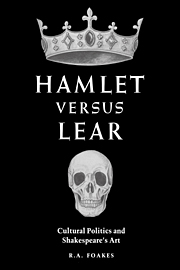2 - Hamlet and Hamletism
Published online by Cambridge University Press: 14 August 2009
Summary
HAMLET PRIVATIZED AND POLITICIZED
The Romantic idealization of Shakespeare as a universal genius established him as a figure of enormous cultural authority, yet at the same time democratized him as a representative consciousness, available for each of us to interpret in his or her own way, untrammelled by scholarship, and regardless of social rank. If Shakespeare ‘gave proof of a most profound, energetic & philosophical mind’, he was also, for Coleridge, ‘a Nature humanized, a genial Understanding directing self-consciously a Power & a[n] 〈implicit〉 wisdom deeper than Consciousness’; Shakespeare was the wonder of mankind, who yet ‘with all his wonderful powers’ made us ‘feel as if he were unconscious of himself & of his mighty abilities: disguising the half-god in the simplicity of a child or the affection of a dear companion’. Since the ‘mighty abilities’ were displaced into Shakespeare's unconscious, everyone might find a ‘dear companion’ in him, a reflection of himself, or could reconstruct Shakespeare as a version of himself. And if Shakespeare had, as Edgar Allan Poe put it, a ‘marvellous power of identification with humanity at large’, that identification could be traced especially in Hamlet, for ‘He wrote of Hamlet as if Hamlet he were.’
The myriad-minded Shakespeare, to use Coleridge's term, had, of course, created a galaxy of characters, but in order for the reader to comprehend the philosopher-poet, the genius whose wisdom penetrated into the depths of human consciousness, he had to be translated into a persona the reader or critic could identify with; and Hamlet, reconstituted as a man with his own existence outside the play, was above all other characters identified with Shakespeare himself.
Information
- Type
- Chapter
- Information
- Hamlet versus LearCultural Politics and Shakespeare's Art, pp. 12 - 44Publisher: Cambridge University PressPrint publication year: 1993
